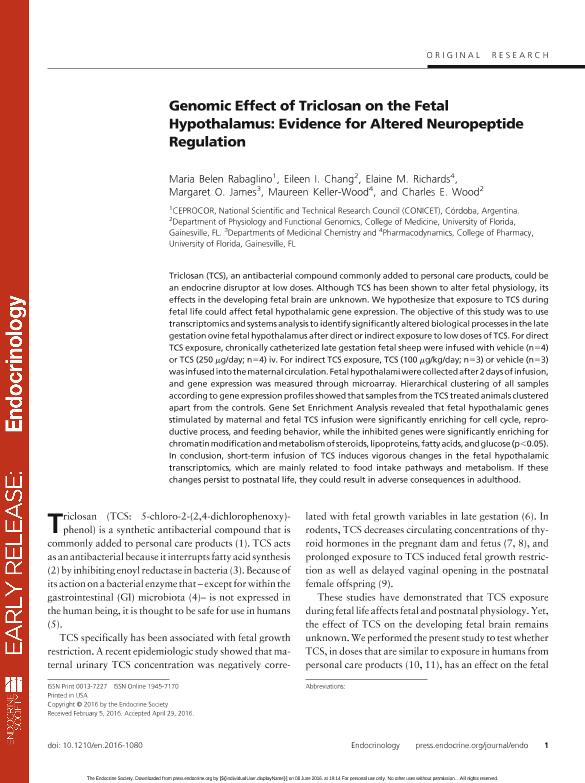Mostrar el registro sencillo del ítem
dc.contributor.author
Rabaglino, Maria Belen

dc.contributor.author
Chang, Eileen I.
dc.contributor.author
Richards, Elaine M.
dc.contributor.author
James, Margaret O.
dc.contributor.author
Keller Wood, Maureen

dc.contributor.author
Wood, Charles E.

dc.date.available
2022-12-02T19:44:58Z
dc.date.issued
2016-07
dc.identifier.citation
Rabaglino, Maria Belen; Chang, Eileen I.; Richards, Elaine M.; James, Margaret O.; Keller Wood, Maureen; et al.; Genomic effect of triclosan on the fetal hypothalamus: evidence for altered neuropeptide regulation; Endocrine Society; Endocrinology; 157; 7; 7-2016; 2686-2697
dc.identifier.issn
0013-7227
dc.identifier.uri
http://hdl.handle.net/11336/180066
dc.description.abstract
Triclosan (TCS), an antibacterial compound commonly added to personal care products, could be an endocrine disruptor at low doses. Although TCS has been shown to alter fetal physiology, its effects in the developing fetal brain are unknown. We hypothesize that exposure to TCS during fetal life could affect fetal hypothalamic gene expression. The objective of this study was to use transcriptomics and systems analysis to identify significantly altered biological processes in the late gestation ovine fetal hypothalamus after direct or indirect exposure to low doses of TCS. For direct TCS exposure, chronically catheterized late gestation fetal sheep were infused with vehicle (n=4) or TCS (250 μg/d; n = 4) iv. For indirect TCS exposure, TCS (100 μg/kg d; n = 3) or vehicle (n = 3) wasinfused into the maternal circulation. Fetal hypothalami were collected after 2 days of infusion, and gene expression was measured through microarray. Hierarchical clustering of all samples according to gene expression profiles showed that samples from the TCS-treated animals clustered apart from the controls. Gene set enrichment analysis revealed that fetal hypothalamic genes stimulated by maternal and fetal TCS infusion were significantly enriching for cell cycle, reproductive process, and feeding behavior, whereas the inhibited genes were significantly enriching for chromatin modification and metabolism of steroids, lipoproteins, fatty acids, and glucose (P<.05). In conclusion, short-term infusion of TCS induces vigorous changes in the fetal hypothalamic transcriptomics, which are mainly related to food intake pathways and metabolism. If these changes persist to postnatal life, they could result in adverse consequences in adulthood.
dc.format
application/pdf
dc.language.iso
eng
dc.publisher
Endocrine Society

dc.rights
info:eu-repo/semantics/openAccess
dc.rights.uri
https://creativecommons.org/licenses/by-nc-sa/2.5/ar/
dc.subject
FETAL HYPOTHALAMUS
dc.subject
MICROARRAY
dc.subject
OVINE FETUS
dc.subject.classification
Biología del Desarrollo

dc.subject.classification
Ciencias Biológicas

dc.subject.classification
CIENCIAS NATURALES Y EXACTAS

dc.title
Genomic effect of triclosan on the fetal hypothalamus: evidence for altered neuropeptide regulation
dc.type
info:eu-repo/semantics/article
dc.type
info:ar-repo/semantics/artículo
dc.type
info:eu-repo/semantics/publishedVersion
dc.date.updated
2022-11-30T22:35:11Z
dc.journal.volume
157
dc.journal.number
7
dc.journal.pagination
2686-2697
dc.journal.pais
Estados Unidos

dc.journal.ciudad
Washington D.C
dc.description.fil
Fil: Rabaglino, Maria Belen. Consejo Nacional de Investigaciones Científicas y Técnicas. Centro Científico Tecnológico Conicet - Córdoba; Argentina. Provincia de Córdoba. Ministerio de Ciencia y Técnica. Centro de Excelencia en Productos y Procesos de Córdoba; Argentina
dc.description.fil
Fil: Chang, Eileen I.. University of Florida; Estados Unidos
dc.description.fil
Fil: Richards, Elaine M.. University of Florida; Estados Unidos
dc.description.fil
Fil: James, Margaret O.. University of Florida; Estados Unidos
dc.description.fil
Fil: Keller Wood, Maureen. University of Florida; Estados Unidos
dc.description.fil
Fil: Wood, Charles E.. University of Florida; Estados Unidos
dc.journal.title
Endocrinology

dc.relation.alternativeid
info:eu-repo/semantics/altIdentifier/url/https://academic.oup.com/endo/article/157/7/2686/2422729
dc.relation.alternativeid
info:eu-repo/semantics/altIdentifier/doi/https://doi.org/10.1210/en.2016-1080
Archivos asociados
